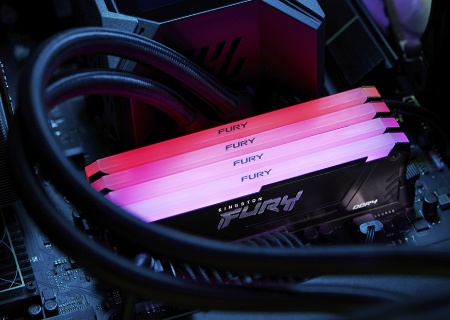To allocate more RAM to Steam games, open Steam, go to Settings, and select “In-Game,” then adjust the “In-Game server browser: Max pings/minute” setting to a higher value to allocate more RAM. This will help improve game performance and reduce lags during gameplay.
Are you looking to enhance your gaming experience by allocating more RAM to your Steam games? Increasing the RAM dedicated to your games can significantly improve performance, reduce lags, and provide a smoother gaming experience. Steam provides a simple and efficient way to adjust the allocated RAM for its games.
By following these steps, you can optimize your system’s resources and enjoy a more seamless gaming experience. We will discuss the steps involved in allocating more RAM to Steam games and the benefits it can bring to your gaming experience. Let’s delve into the details of how to optimize your gaming experience by allocating more RAM to Steam games.

Credit: www.kingston.com
Why Allocating More Ram To Steam Games Is Crucial
When it comes to gaming performance, allocating more RAM to Steam games is crucial. With the increasing demand for high-quality graphics and complex game designs, having sufficient RAM is essential to ensure a smooth and immersive gaming experience. In this article, we will explore the benefits of allocating more RAM to Steam games and how it can significantly improve gaming performance.
Benefits Of Allocating More Ram To Steam Games
1. Enhanced gaming experience
2. Reduced loading times
3. Bypassing system lag
How Allocating More Ram Improves Gaming Performance
When you allocate more RAM to your Steam games, it enables the games to access additional memory, resulting in enhanced performance. This allows the games to load assets more quickly, reducing loading times and diminishing system lag. With more RAM allocated, the games can run smoother and the overall gaming experience is significantly improved.
How To Allocate More Ram To Steam Games
When it’s time to play your favorite games on Steam, having enough RAM can significantly improve your gaming experience. Allocating more RAM to your Steam games can help reduce lag, improve load times, and ensure smoother gameplay. Here’s how you can do it:
Step 1: Check Your System Requirements
Before making any changes, make sure your system meets the required RAM specifications for the game you want to play on Steam. This can typically be found on the game’s store page or on the developer’s website.
Step 2: Close Unnecessary Background Processes
To free up more RAM for your Steam games, close any unnecessary background processes and applications that may be running in the background. Use the Task Manager (Ctrl+Shift+Esc) to identify and close these processes.
Step 3: Adjust Steam Game Settings
Within the Steam client, you can adjust the game settings to allocate more RAM to a specific game. Right-click on the game in your library, go to Properties, and then set launch options. You can add the “-heapsize [RAM amount]” command to allocate more RAM to the game.
Step 4: Increase Virtual Memory Settings
Increasing your system’s virtual memory can also help allocate more resources to your Steam games. To do this, go to your computer’s Control Panel, click on System and Security, then System, and finally, click on “Advanced system settings” in the left pane. Under the Advanced tab, click on Settings under Performance, go to the Advanced tab again, and click on Change under Virtual memory. Here, you can adjust the virtual memory settings to allocate more RAM to your games.
Other Tips For Boosting Gaming Performance
Boost your gaming performance by allocating more RAM to your Steam games. Maximize gameplay experience with this simple tip.
Other Tips for Boosting Gaming PerformanceUpdate Graphics Card Drivers
Updating your graphics card drivers is a crucial step in optimizing your gaming performance. Outdated drivers can lead to poor graphics, glitches, and even crashes. Visit the manufacturer’s website to find the latest drivers for your graphics card model. Download and install them to ensure smooth and efficient gameplay.Reduce In-Game Graphics Settings
One effective way to enhance your gaming performance is by reducing the in-game graphics settings. Lowering the graphics quality will put less strain on your system, allowing it to allocate more resources to the game. Adjust settings such as resolution, texture quality, shadows, and anti-aliasing to find the balance between visual appeal and smooth gameplay.Clear Temporary Files and Optimize Storage
Over time, your computer accumulates temporary files that can take up valuable storage space and slow down performance. Clearing these files will free up storage and ensure your system runs at its optimal speed. Additionally, optimizing your storage by defragmenting your hard drive or upgrading to a solid-state drive (SSD) can further improve gaming performance.Upgrade Hardware Components
If you’re looking to take your gaming performance to the next level, consider upgrading hardware components in your system. A more powerful graphics card, additional RAM, or a faster processor can significantly boost your gaming experience. Evaluate your system’s specifications and identify areas where an upgrade would bring the most noticeable improvement in performance.In conclusion, by updating graphics card drivers, reducing in-game graphics settings, clearing temporary files, optimizing storage, and upgrading hardware components, you can optimize your gaming performance and enjoy a smoother and more immersive gaming experience. Remember, these tips can make a significant difference in gameplay, so don’t hesitate to implement them and see the positive impact on your gaming sessions.
/img_03.png?width=1029&name=img_03.png)
Credit: www.avast.com
Common Limitations And Considerations
To optimize your Steam gaming experience, it is important to allocate more RAM. By doing so, you can overcome common limitations and ensure smoother gameplay with enhanced performance. Make the most out of your gaming sessions by boosting your RAM allocation.
Common Limitations and Considerations RAM limitations and compatibility When it comes to allocating more RAM to Steam games, it’s crucial to understand the limitations and compatibility factors that may come into play. RAM, or Random Access Memory, is an essential component when it comes to gaming performance. By increasing the allocation of RAM to Steam games, you can enhance their speed and overall gameplay experience. However, there are a few limitations and considerations you should keep in mind. One of the main limitations to consider is the maximum supported RAM capacity of your system. Each computer has a certain limit to how much RAM it can handle, and exceeding this limit could potentially cause instability or even damage to your system. It’s important to check your computer’s specifications and ensure that increasing the RAM allocation is within the supported range. Compatibility is another crucial factor to consider. Not all games or applications may be compatible with increased RAM allocation. Some older games or software might have specific memory requirements, and allocating more RAM than necessary could lead to compatibility issues or even crashes. It’s essential to do some research and check the system requirements of the games you intend to allocate more RAM to before proceeding. Impact on other system processes Allocating more RAM to Steam games can have a significant impact on other system processes. RAM is utilized by various background tasks and applications running simultaneously with the game. Increasing the RAM allocation for games means less memory available for other processes, potentially causing slower performance or even system instability. It’s crucial to consider the RAM requirements of other applications you frequently use while gaming. For example, if you like to stream your gameplay or use voice chat software while playing, allocating more RAM to Steam games might affect the performance of these applications. You might experience lags, audio issues, or even crashes if sufficient RAM is not available for these processes. Potential risks and drawbacks While increasing RAM allocation can improve gaming performance, it’s important to be aware of the potential risks and drawbacks involved. One of the risks is that allocating more RAM may not always result in significant performance improvements. It depends on various factors such as the game’s optimization, your computer’s hardware capabilities, and the overall system load. Another drawback is that allocating more RAM to a game leaves less memory available for other system processes. This can impact multitasking abilities and may result in slower performance for tasks such as running background applications or browsing the internet simultaneously. Additionally, if your computer has limited RAM capacity, allocating a significant portion to games might lead to overall system slowdown and reduced performance. In conclusion, while allocating more RAM to Steam games can enhance their performance, it’s essential to consider the limitations and compatibility factors associated with it. Understanding the RAM limitations and compatibility of your system, the impact on other processes, and the potential risks and drawbacks is crucial before making any changes. By taking these considerations into account, you can optimize your gaming experience while maintaining a stable and efficient system.
Credit: www.avg.com
Frequently Asked Questions Of Allocate More Ram To Steam Games
How Do I Allocate More Ram To Steam Games?
To allocate more RAM to Steam games, you can follow these steps: 1. Open the Steam client. 2. Go to the “Library” tab. 3. Right-click on the game you want to allocate more RAM to. 4. Select “Properties”. 5. Click on the “Local Files” tab.
6. Click on “Set Launch Options”. 7. In the text box, type “-heapsize [desired RAM amount]”. 8. Click “OK” to save the changes.
Does Allocating More Ram Improve Game Performance On Steam?
Allocating more RAM to Steam games can potentially improve game performance, especially if you are experiencing lag or other performance issues. More RAM allows for smoother multitasking and can provide extra memory for the game to utilize, reducing load times and increasing performance.
How Much Ram Should I Allocate To Steam Games?
The amount of RAM you should allocate to Steam games depends on the specific requirements of the game and your PC’s overall system resources. Generally, allocating at least 4GB of RAM should be sufficient for most games. However, for more demanding games or if you have a lot of background processes running, allocating 8GB or more may be beneficial.
It’s important to find the right balance to ensure optimal performance.
Conclusion
By allocating more RAM to your Steam games, you can enhance their performance and enjoy a smoother gaming experience. Remember to follow the step-by-step guide provided in the blog post to ensure that you make the most out of your system’s resources.
With increased RAM allocation, you’ll be able to run your favorite games seamlessly and take your gaming sessions to the next level. So why wait? Start optimizing your gaming experience today!



